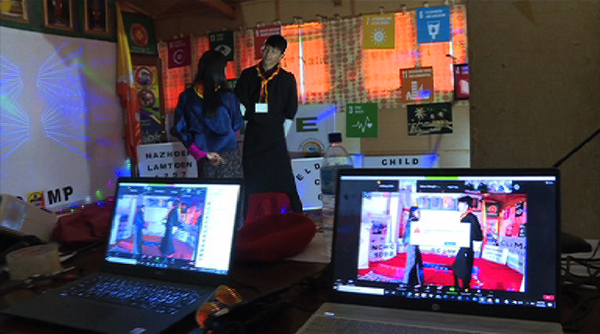 The first Gyalyong Nazhoen Camp or G-camp in short engaged over 8000 youth from across the country in a three-day virtual event. The participants, comprising scouts and non-scout students, were engaged in various advocacy, skilling, and fun activities virtually during the event, which ended today.
The first Gyalyong Nazhoen Camp or G-camp in short engaged over 8000 youth from across the country in a three-day virtual event. The participants, comprising scouts and non-scout students, were engaged in various advocacy, skilling, and fun activities virtually during the event, which ended today.
A skit advocating about teenage pregnancy and how one can seek counselling services if faced with such a challenge. This was one of the creative ways in which the camp advocated various social issues to the participants.
The programme was aimed at keeping students retained in hostels during the summer break. The camp was also extended to day scholars.
“When students are kept locked up in schools, it will affect them psychologically, leading to mental health issues. We showed them the way to seek support if they experience mental health issues. Teenage pregnancy is one example. From an academic perspective, we conducted quizzes, which tested their knowledge about scouting,” said Yeshi Dhendup, a teacher of Taba Lower Secondary School.
Students were also introduced to hydroponics agriculture. The participants’ BBS talked to and those who shared their impressions of the camp virtually said it had been an enriching experience.
“The one thing I have learnt might be common and ordinary but it is still a reminder for the youth that the youth are not supposed to indulge in drugs and not even in sexual intercourse. Teenage pregnancy and drug use are very dangerous that they might even ruin our whole lives,” said Rinchen Tshering, one of the participants.
“After attending the camp, I can assure you that it was no less than the normal camps we attend. It was value-based, entertaining and what’s truly called education beyond the textbook,” said Pema Yangchen, another participant.
“We got meet new friends from across the country through the camp. This gave me a lot of happiness. We could share the various skills we have with others and learn the skills other have,” said Namgay Tenzin, another participant.
The Bhutan Scouts Association hosted the virtual camp with financial support from UNICEF.
Sherub Dorji




